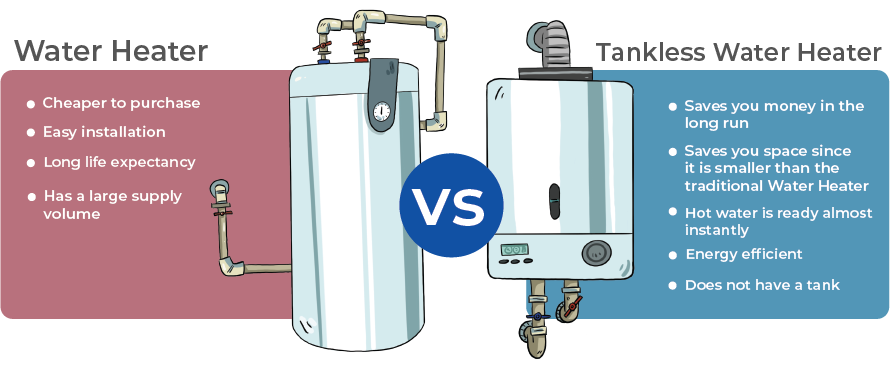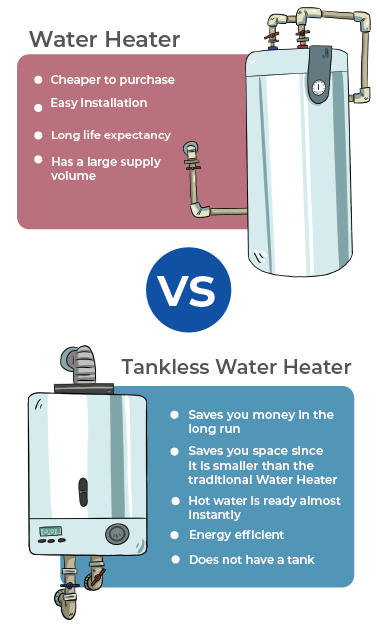As the temperature outside starts to decrease, the temperature of the water used inside starts to increase. But what happens when all of a sudden, the water goes from hot, to lukewarm, to cold? Wouldn't you rather keep your water hot for those hot showers and steaming cups of coffee?
Whether you are struggling with keeping your water warm or tired of dealing with the sky-high prices on your bill, it's time to find a solution that works best for your home. A terrific way to save energy, money, and potentially even space is to invest in a tankless water heater.
Have a heating, cooling, or plumbing problem, but no time to wait for a repairman? Need a second opinion on an existing quote?
We’ll give you free advice about your question or problem. In many cases, you’ll get an estimate or the help you need during the video call.
What exactly is a tankless water heater?
“Tankless,” “instantaneous,” and “demand-type” are all synonymous when referring to this type of water heater. Just like a traditional water heater, the product is hot water; what is unique about the tankless water heater is the process of that product.
A traditional water heater has a large tank that stores a reserve of water that is constantly heated. When you turn on a hot water valve, the water is released, the storage tank is refilled, and that new water will sit heated until it is used.
A tankless water heater, though, does not use a tank – hence the name! Instead, the water is heated on demand. When you turn on the hot water valve, a heating mechanism is immediately triggered and the water is warmed for as long as the hot water tap is on. Then, the water is sent through a pipe and out of a faucet.
There are numerous factors to consider when choosing a tankless water heater. First, determine if you want the machine to be powered by gas or electricity. Then consider the flow, as different types of tankless water heaters offer varying flow rates. Also, be sure to secure a warranty that protects the heat exchanger, as this is a tankless water heater’s core component.
Pros & Cons of a tankless water heater
Tankless water heaters might not be for everyone. Consider the items listed below before you purchase a new water heater.
Cost and lifespan
Do tankless water heaters save money in the long run? Absolutely! However, they will be more expensive upfront. A traditional water heater will cost around $500, while a tankless water heater starts at around $1,000. With that in mind, do not let this initial cost deter you. A tankless heater's lifespan will last roughly 10 years longer than a traditional water heater, which could possibly save you thousands in expenses compared to the traditional water heater.
Energy efficiency
When it comes to energy efficiency, it is agreed that the tankless water heater is one of the best solutions on the market. In fact, Consumer Reports states tankless water heaters are 22% more efficient than standard models.1 Tankless water heaters waste no energy on water not being presently used. One of the leading manufacturers in energy-efficient tankless water heaters, Energy Star, states that by “heating water only when you need it… tankless water heaters save a family of four… $1,800” over the lifespan of the machine2.
Access and consistency of temperature
The obvious benefit of a tankless water heater is that hot water is available almost instantly. In contrast, the traditional water heater’s temperature could be significantly cooler, especially if there is a larger quantity of water in the tank. Tankless water heaters are not without their challenges, though. Inconsistent temperatures have been reported, most likely due to multiple hot water needs at one time. If someone is taking a shower, another is running the dishwasher, and there's a load in the washing machine, a tankless water heater might struggle to keep the supply of hot water even.
Installation
Usually, a tankless water heater will cost a bit more to install. However, the absence of the tank will allow you to save some additional square footage
Commercial Service is always happy to send over a certified technician to assess any potential problems. For non-emergency situations, schedule an appointment with our easy Online Scheduling or by calling





